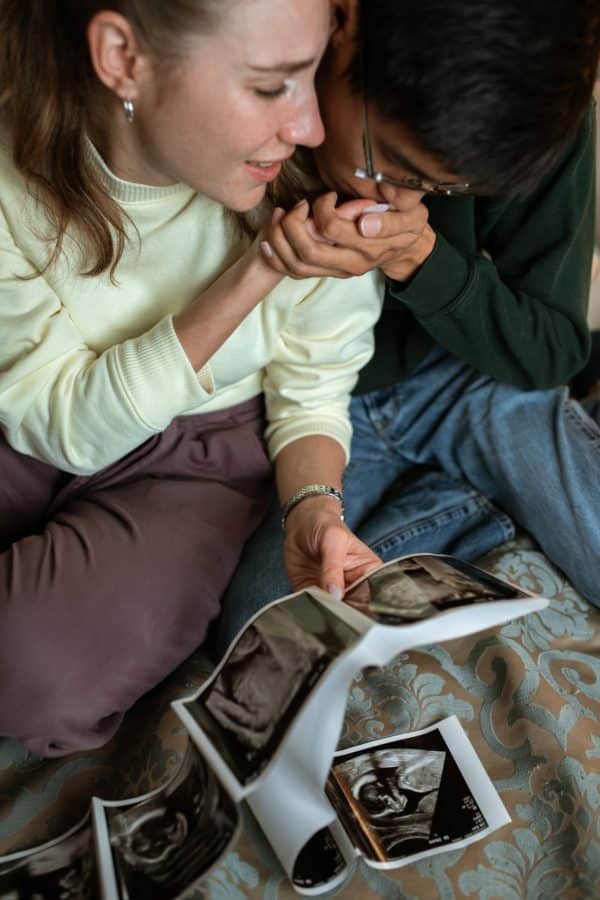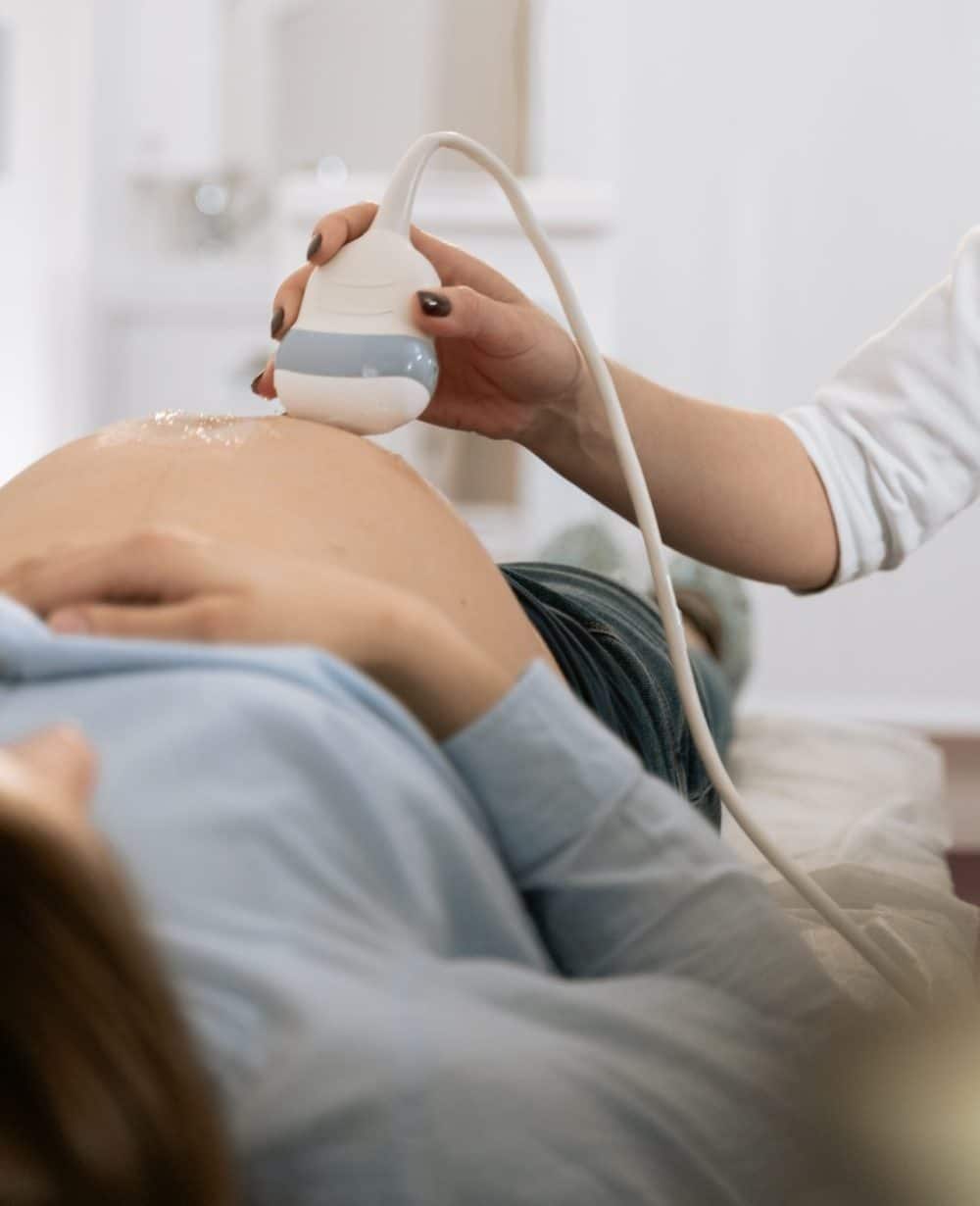Prenatal diagnostics: prenatal examinations of my baby
Prenatal diagnostics: ethics versus the desire for security
Expecting parents want an uncomplicated pregnancy. Most pregnant women make use of prenatal diagnostics in order to be able to await their child with a good feeling. Yet the majority of all babies are healthy. If you still want to use PND, you should discuss your position towards prenatal diagnostics with your partner before the first ultrasound and whether you share similar ethical beliefs. For example, use the following overview to talk to your partner about whether you consider PND with all its consequences to be useful and what decisions you would make.

Possibilities of prenatal diagnostics
- Some diseases, such as diaphragmatic hernia or a thickened bladder, can already be treated in the womb [1].
- The starting conditions for the child’s life can be easier in the case of certain illnesses or disabilities if the family makes use of counseling selling services at an early stage and prepares for the special features.
- The birth registration can already take place in a specialized clinic in order to ensure the best possible initial care, if for example a heart defect is identified.
- An inconspicuous result reassures the parents-to-be and relieves them of worries and stress.
Limits of prenatal diagnostics
- Only a small proportion of possible diseases can be detected and treated by PND.
- The examinations can reveal or confirm a suspicion or an increased risk of a malformation or disease. However, they cannot predict the severity or further causes of the disease.
- Inconclusiv examination results can place a heavy psychological burden on the parents and severely disrupt the bond with the child.
- In the case of a serious illness, the parents may be asked to make a decision about continuing or terminating the pregnancy which they then have to make.
Make informed choices from the beginning
Prenatal diagnostics have become common in gynaecology. Nevertheless, expecting parents who do not want to be confronted with the possibility of an abortion should carefully consider which examinations they would like to have carried out. Supposed abnormalities can set a machinery of further examinations in motion, leading to grueling waiting times for test results and sometimes severely affect the relationship with the partner and the child. With many examinations, false alarms are possible, which lead to unnecessary uncertainty and stress for the parents to be. At the same time, parents are lulled into a false sense of security if an abnormality is not detected.
Decisions need time — otherwise there is a risk of guilt
For example, as soon as a trisomy 21 diagnosis is made, the majority of expecting mothers do not want to continue their pregnancy. Nevertheless, the consequences in such a case need to be carefully considered. “Decisions made too quickly can lead to difficult, delayed or pathological mourning processes, or the misguided mourning leads to never-ending feelings of guilt and ambivalence,” as Sabine Hufendiek of the Protestant Central Institute Berlin reports in a professional article. [5] The journalist Matthias Thieme, the father of a daughter with Down syndrome, also points out the points neglected by the purely medical view of prenatal diagnostics: “The mothers and fathers learn nothing about life with such a child, about the potential for happiness and fulfillment.” [4]
You have the right not to know
In the context of screening or PND, you can decide for yourself what information you want to receive and how detailed the information should be. For example, you have the right to consciously decide against ultrasound examinations. You can also agree with the doctor that you only want to be informed about age-appropriate development during the basic ultrasound examinations, but not about malformations. [6] However, this requires your signature, which releases the doctor from his or her obligation to provide information.
Conclusion: Prenatal diagnostics
The medical view is not necessarily the decisive one
Prenatal diagnostics can reveal certain diseases and abnormalities at an early stage, but it can also be very unsettling. Above all, it is a purely a medical point of view. From a scientific perspective, the modern possibilities of PND are revealing and promising. But then there is the emotional, individual, human level that makes pregnancy a highly complex event in the lives of expecting parents. To make a well-founded decision about whether and how you want to use prenatal diagnostics for your own benefit, it is a good idea to have an in-depth discussions with your doctor, your midwife or at a pregnancy counselling centre. This will help you to strengthen your own intuition.
You can find more information about the methods and risks of prenatal diagnostics in the second part.
» Prenatal diagnostics: Methods
About Fertilly
At Fertilly, we have made it our mission to accompany couples (homosexual and heterosexual) and singles on the way to fulfilling their child wish. In doing so, it is important to us to create transparency in the area of fertility services, to provide information and knowledge on the topics of pregnancy and fertility and to help you to find the most suitable Fertility Center. Through cooperation with first-class Fertility Centres and clinics in Europe, enquiries about Fertilly are given preferential treatment. This means that our patients avoid the usually long waiting times and get appointments more quickly.
If you would like more information about Fertility Centers, success rates and prices, please contact us using this questionnaire. We will advise you free of charge and without any obligation.
-
Answer the first questions in the online form in order to book an appointment. This way we can better address your needs during the conversation.
-
We will find the best contact person for your individual needs. Schedule 20 minutes for the consultation.
-
We will introduce you to the right fertility clinic from our network, make an appointment and accompany you until your wish for a child is fulfilled.
Sources:
1. https://www.wissenschaft.de/umwelt-natur/operation-im-mutterleib/
2. https://www.g‑ba.de/downloads/83–691-324/2013–07-01_Merkblatt_Ultraschall_Heft.pdf
3. Janvier, Annie., Farlow, Barbara , Barrington, Keith (2016): Parental hopes, interventions, and survival of neonates with trisomy 13 and trisomy 18. In: American Journal of medical genetics, Jg. 172, H 3, S. 279–287
4. Thieme, M. (2016): Eltern als Selektierer. Debatte Pränataltests und ihre Folgen. In: taz, die tageszeitung, 28.11.2016, www.taz.de/!5357522/ (26.6.2019)
5. Hufendiek, Sabine (2019): Beratung zwischen Befunden und Befinden – Paare in der Beratung. In: Vortrags- und Workshop- Sammlung und Fachtagung‚ Verantwortung leben – ohne Zweifel geht es nicht‘, S. 70.
6. https://www.g‑ba.de/downloads/83–691-324/2013–07-01_Merkblatt_Ultraschall_Heft.pdf, S. 8










